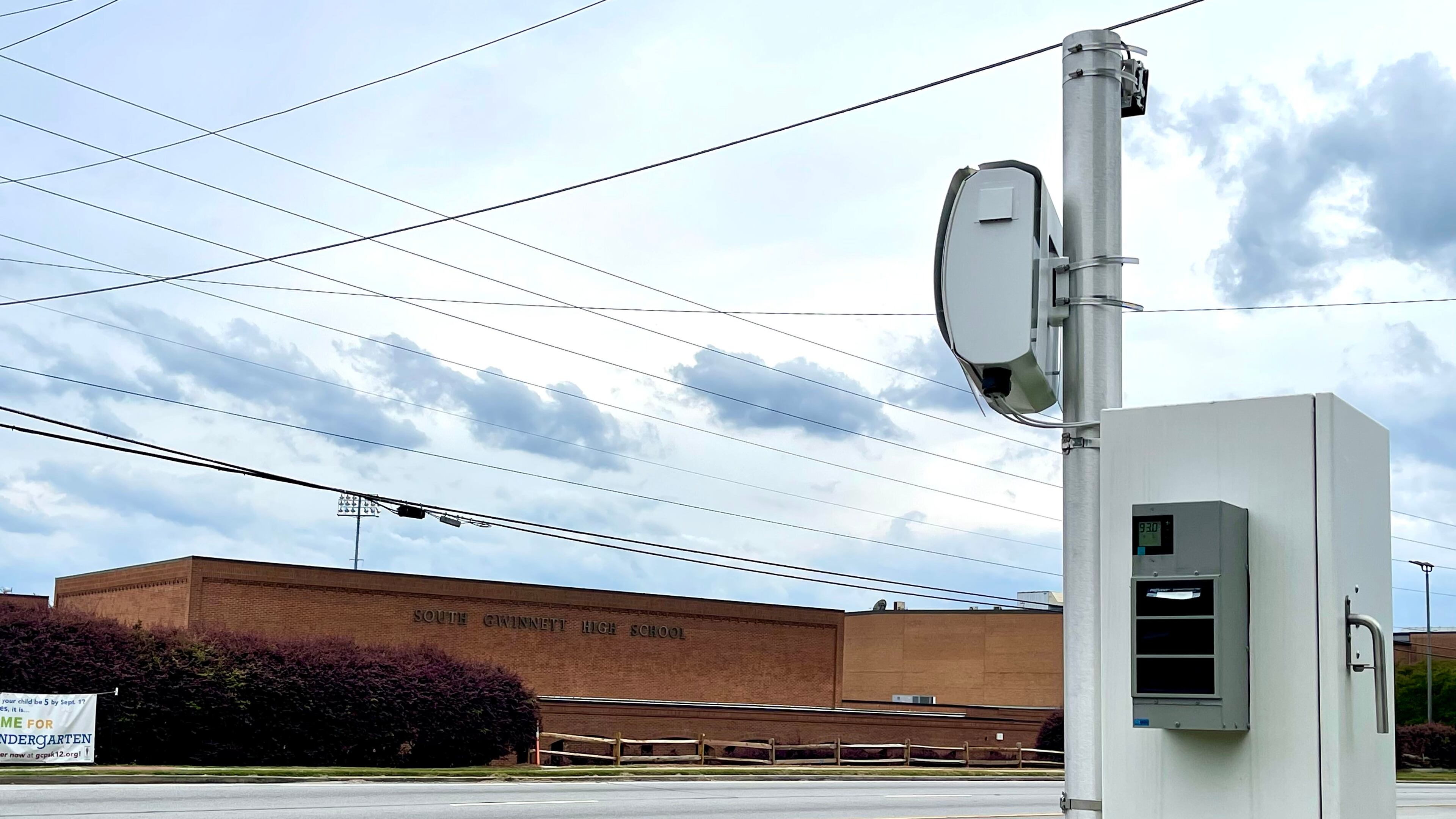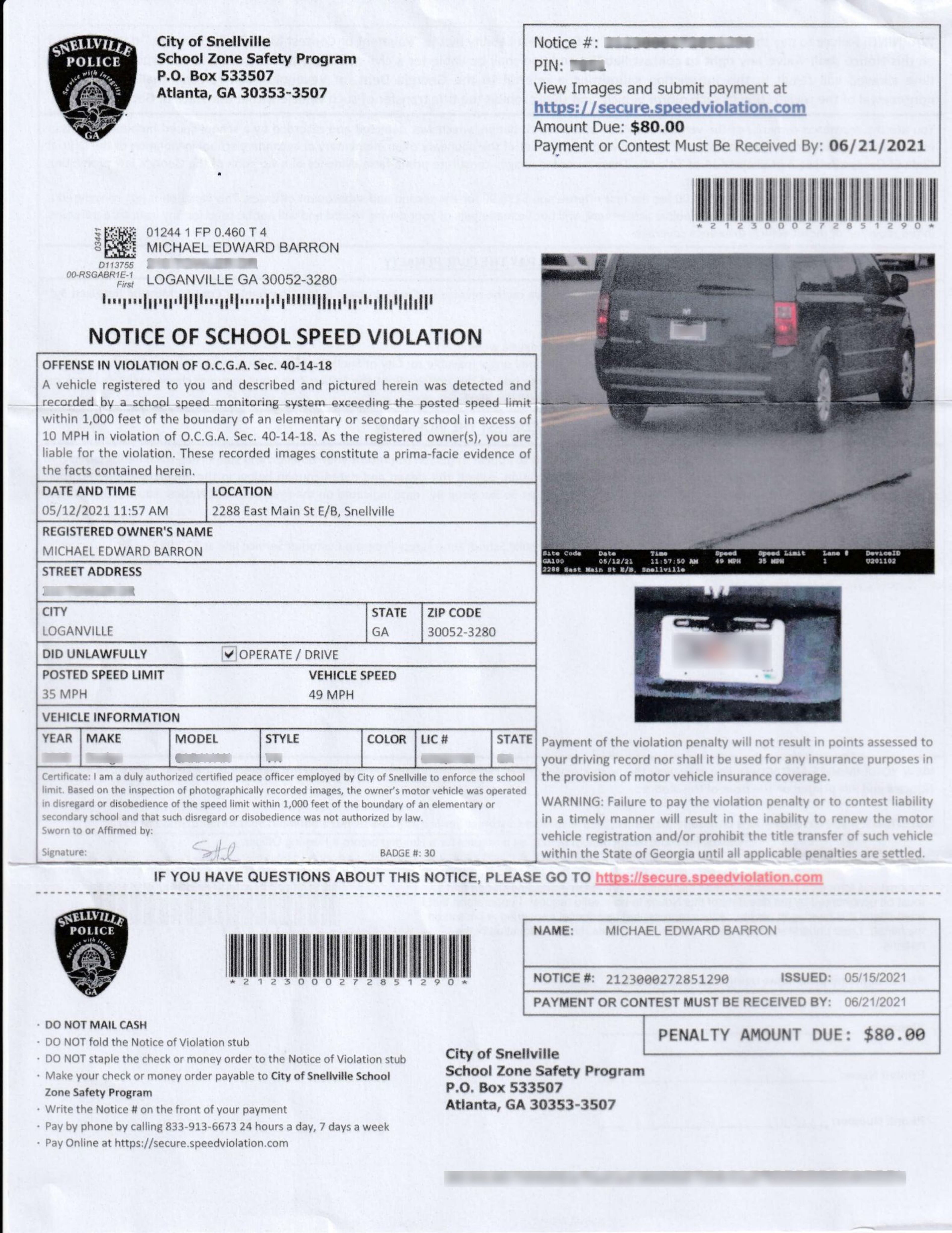Gwinnett County projects $4.4 million in ticket revenue from new speed cameras

Gwinnett County expects $4.4 million in ticket revenue from new speed-monitoring cameras installed by the same company that has already generated an estimated $3 million among four Gwinnett cities.
Gwinnett County Board of Commissioners unanimously approved a contract June 1 for RedSpeed USA to install cameras at no cost in select school zones. The county will keep 71.6% of all revenue generated, estimated at $6.1 million in the contract’s first year. The Illinois-based company will keep the rest, estimated at $1.7 million.
In the metro Atlanta area, Henry and Clayton are the only other counties that have installed RedSpeed cameras. A total of 40 counties and cities across Georgia, including Duluth, Lilburn, Norcross and Snellville, contract with the company, following a 2018 state law that allows them.
A spokesperson for the Gwinnett County Police Department could not provide the speed above the limit that would result in tickets, nor the number of cameras that will go up in unincorporated area in school zones.
Gwinnett County Police Chief Brett West told the Board of Commissioners that the department will work with the county’s Department of Transportation and the school system to determine where the cameras — which will be installed in the coming school year — are most needed.
The cameras are intended to increase safety for pedestrians and drivers, Gwinnett County Police Chief Brett West said. County Chairwoman Nicole Love Hendrickson said she had already seen people slow down near her son’s school because they think speed cameras have been put in.
“This is the reason, to slow people down,” West said.
Speeders seeing red
The speed cameras located near three schools in Snellville started ticketing drivers in February after a 30-day grace period, becoming a hot topic on Facebook groups. An hour before school until an hour after, the cameras flag anyone driving 11 mph over the posted speed limit on days school is in session.

Snellville speeders are fined $80 for the first offense and $125 for subsequent offenses, fees similar to amounts in other Gwinnett cities. An officer verifies video footage before violators receive tickets in the mail.
Gwinnett cities keep 65% of all ticket revenue from the cameras while RedSpeed, which installs the cameras at no cost to local government, pockets the rest. “(RedSpeed) provides all the equipment, has all the software systems and everything that runs it, so they do get a share of it,” said Snellville Police Chief Roy Whitehead.
Snellville has received about $848,000, which can be spent on anything related to public safety except salaries or benefits, Whitehead said.
About 39,500 people have received tickets due to Snellville’s cameras, police say. The majority of tickets are written on U.S. Highway 78, where the speed limit remains 35 mph while passing through much of Snellville.
The Atlanta Journal-Constitution reached out on social media to ticketed drivers. Loganville resident Brandy Coble, who received an $80 ticket for going 48 mph on the highway, believes the cameras are more about profit than safety.
“Yes, it’s speeding in that area, but it’s not like I was going 70,” Coble said. “What they’re doing is they’re automating policing instead of using the city’s own resources.”
“I feel like it’s just a money grab for them,” said Michael Barron, a Loganville resident who plans to fight an $80 ticket for traveling 49 mph on U.S. 78.

Warning signs that say “photo enforced” with the speed limit are posted ahead of school zones that have speed cameras. Points are not assessed on anyone’s license from a speed camera violation, but an unpaid fine can prevent someone from registering their vehicle when it’s time to renew.
Whitehead contends the cameras are “revenue neutral,” assuming people obey the speed limit.
“Think about how many violations are committed every day that people are not caught with. No one wants a ticket, and that’s what their complaint really is,” he said.
Snellville’s cameras seemed to have slowed drivers. On U.S. 78, which sees 100,000 cars each day, daily violations dropped from 733 in February to 296 in April. On roads with cameras, the number of tickets has declined between 56% to 86% in that time span.
A pedestrian was hit by a moving car and killed in Snellville only one month before the cameras were installed. The 37-year-old was walking across U.S. 78, not in a crosswalk, at about 6:30 p.m. near South Gwinnett High School.
It could cost Snellville thousands of dollars each year to install its own cameras, Whitehead said. By using cameras, officers can patrol other areas instead of staking out in front of schools, he said.
“If we’re out there trying to use a police car to make those traffic stops, we have to get into that traffic to make those stops. That can create another hazard,” the police chief said.

Cities seeing green
About 2,600 tickets issued by Lilburn from March 2020 to April 2021 resulted in approximately $134,500 for the city, according to Lilburn data.
Duluth has received about $447,000 from approximately 22,000 tickets sent out since August 2020, said Officer Ted Sadowski, a spokesman for Duluth police. Only 6% of tickets are issued to repeat offenders, he said.
Board of Commissioner Kirkland Carden, a former councilmember in Duluth, said he received several positive emails from Duluth residents after the city put them up. “I do think these programs have some impact on deterring people from speeding in our school zones,” he said at the June 1 commissioners meeting.
Norcross has received about $1.6 million from approximately 60,000 tickets issued since February 2020, said Police Chief Bill Grogan. The city experienced a 47% decline in vehicle crashes near school zones from 2019 to 2020, he said, though some of it may be attributed to less cars on the road during the pandemic.
“Unfortunately, it doesn’t prevent all speeding; we still see speeds over double the posted limit in the school zones,” Grogan said in an email. “Scary to think what that vehicle does to another car, or pedestrian, in a crash.”





